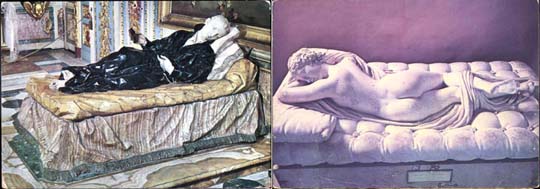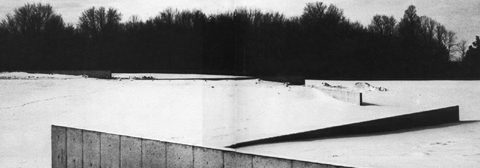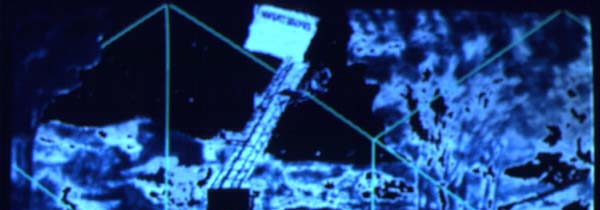![body]()
Aristotle distinguished between the body and the soul. The latter referred not only to the principle of life, but to the form of a particular living body. Thus the soul is the organization of the body. (cf. organism) Aristotle rejected the doctrine of the Pythogoreans, according to which the soul can clothe itself in different bodies. (see clothing/garment ) Instead, a particular soul is the entelechy, or formative force of a particular body, and the individuality of a particular man. Thus every particular soul requires a connection to a particular organic whole. At the same time, he upheld a division between matter and form which describes, for example, the relation between the eye and sight. When the power of sight is absent, the eye is no longer an eye in the proper sense. After taking the position that "..there seems to be no case in which the soul can act or be acted on without involving the body," Aristotle goes on to suggest that thinking is the one specific activity of the human soul which is capable of separate and independent existence from any connection to the body. (see also subject )
Read MoreThe "body without organs" and the "organs-partial objects" are concepts that Deleuze and Guattari mobilize in opposition to the organism and its organization, in opposition to the functional specificity of organs, so as to release the decoded and deterritorialized flows of desire. The BwO is the "anorganism of the body" a bundle of virtual affects in a non-organic and non-organized multiplicity, "molecular" rather than "molar."
Read MoreCellular Automata were invented by Stanislaw Ulam in the late 1940's and used by John von Neumann in his theoretical investigations of self- replication in machines. A cellular automaton is a lattice of finite automata that all obey transition functions defined by the local context of each cell at any given time.
Read MoreA closed system in statistical thermodynamics is one in which the number of particles as well as the total energy are fixed by boundary conditions. Closed systems systems tend towards equilibrium and to increse in entropy.
Read MoreThe modern awakening of interest in complexity as a science began in Vienna in 1928, with Ludwig von Bertalanffy's largely descriptive graduate thesis on living organisms as systems. A few years earlier Alfred North Whitehead had described his similar vision of a "philosopy of organism" in Science and the Modern World. Whitehead describes his theory of the organic conception of nature as based on "self-knowledge of our bodily event." This total bodily event is on the same level as all other events, except for an unusual complexity and stability of inherent pattern. (Science and the Modern World, p. 73)
Read MoreFor Georges Bataille, (sexual)"Reproduction implies the existence of discontinuous beings." (Erotism, p.12) Each being is distinct from all others, including its parents, who are distinct from each other. For Bataille death means the continuity of being and is brought into play by reproduction. Death is the end of discontinuous being, of the being formed at the moment when the discontinuous entities of sperm and egg unite to form a new continuity, when two become one, and a new entity is formed from the fatal fusion. The fascination with both reproduction and death is the dominant element in Eroticism.
Read More"When the going gets tough, the tough go shopping."
Consumerism is an acceptance of consumption as a way to self-development, self-realization, and self-fulfillment. It makes a clear separation between producers and consumers. In a consumer society an individual's identity is tied to what s/he consumes. People living in consumer cultures have a tendency to satisfy social, emotional, and spiritual needs with material things.
For critics of consumerism, such as Zygmunt Bauman (Consuming Life), “the consumerist society has to rely on excess and waste” (p.38) The advent of consumerism augurs the era of ‘inbuilt obsolescence” and the insatiability of needs. New needs need new commodities; new commodities need new needs and desires, and this dynamic makes individuals wish to do what is needed for the to enable the system to reproduce itself. Thus consumption is a “hedonic treadmill” (p.45). Its promises of satisfaction remain seductive only as long as the desire stays ungratified.
Read MoreIn The Critical Historians of Art, Michael Podro distinguishes questions that are "archaeological" from "critical" questions. The latter, which address the role and nature of concepts of art, "require us to see how the products of art sustain purposes and interests which are both irreducible to the conditions of their emergence as well as inextricable from them." (pxviii)
Read MoreFor Kant, The power of judgement is a mediating element between (theoretical) understanding and (practical) reason, between concepts of nature and concepts of freedom (natural philosophy and moral philosophy, the sensible and the supersensible), between the is and the ought.
Read MoreThis project dates from 1984, and its caption, "This may seem an inordinately abstract and circuitous entry into our subject." may now not seem so provocative or even accurate. (The caption, incidentally is a quote from an essay by Hayden White in his study of historical writing as narrative form.)
Read MoreIs the cyborg an improved hybrid species that has the capacity to be humanity's evolutionary successor? This is the starting point for Manuel DeLanda's evocation of future "robot historians" writing the history of " War in the Age of Intelligent Machines." Warfare has been the primary arena for the technological development of cybernetics, but the cyborg has become a figure that brings toget her science fiction and technology in unexpected combinations. If the Terminator and Robocop exemplify some of the issues of aggression for a masculine image of the cyborg in the contemporary imagination, the concept has been developed in a feminist perspective as well.
Read MoreIn Totem and Taboo, Freud traced the evolution of attitudes toward death in human civilization -- toward individual death and death in general -- to death as the ultimate expression of human helplessness. (Shur, Freud Living and Dying, p. 280)
Read MoreFreud's use of the word Wunsch, which corresponds to 'wish' does not have the same connotations as the English word 'desire" or the French désir . His clearest elucidation of the concept is in the theory of dreams. Freud does not identify need with desire. Need can be satisfied through the action which procures the adequate object. (eg. food) Wishes, on the other hand, are governed by a relationship with signs, with memory-traces of excitation, and the desire to re-cathect mnemic images. The Freudian conception of desire refers above all to unconscious wishes, bound to indestructible infantile signs, organized as phantasy.
Read MoreIn the Anti-Oedipus, subtitled Capitalism and Schizophrenia, volume 1, and first published in 1972, Gilles Deleuze and Félix Guattari engaged in a radical critique of Freudianism. Like their contemporary, R.D. Laing, and like Wilhelm Reich before them, they linked psychic repression with social repression, and sought to recover the revolutionnary quality of desire.
Read MoreMary Douglas, in Purity and Danger describes dirt as "that which has no place." As we know it, dirt is essentially disorder. Dirt offends against order. Eliminating it is not a negative moment, but a positive effort to organise the environment. Rituals of purity and impurity create unity in experience. (Mary Douglas, Purity and Danger) (cf formless)
Read MoreA prisoner, in his cell, kneeling at prayer before the central inspection tower. "morals reformed -- health preserved -- industry invigorated --instruction diffused -- public burthens lightened -- Economy seated, as it were, upon a rock .... all by a simple idea in architecture." Jeremy Bentham
Read MoreIn proposing to examine the general economy of discourses on sex, Michel Foucault states his objective of defining "the regime of power - knowledge - pleasure that sustains the discourse on human sexuality in our part of the world." (p.11) For Foucault, "the 'economy' of discourses -- their intrinsic technology, the necessities of their operation, the tactics they employ, the effects of power which underlie them and which they transmit -- this, and not a system of representations, is what determines the essential features of what they have to say." (p.69)
Read MoreIs hierarchy inevitable when making dichotomous distinctions? Does one term inevitably become the priveleged term and the other its suppressed, subordinated, negative counterpart?
Read Morewhat is the relation between the ego and the subject? According to Freud, the ego is an agency of the psyche,by means of which the subject aquires a sense of unity and identity, "a coherent organization of mental processes." (XIX,17.) Through consciousness , the ego is the site of differentiation between inside and outside, between "subjective" and "objective." The passage from the ego as biological individual to the ego as an agency: "such is the entire problematic of the derivation of the psychoanalytic ego . " (Jean Laplanche, Life and Death in Psychoanalysis, p. 76)
Read More"After three thousand years of explosion, by means of fragmentary and mechanical technologies, the Western world is imploding. During the mechanical ages we had extended our bodies in space. Today, after more than a century of electronic technology, we have extended our central nervous system itself in a global embrace, abolishing both time and space as far as our planet is concerned." (Marshall McLuahan, Understanding Media.)
Read More




